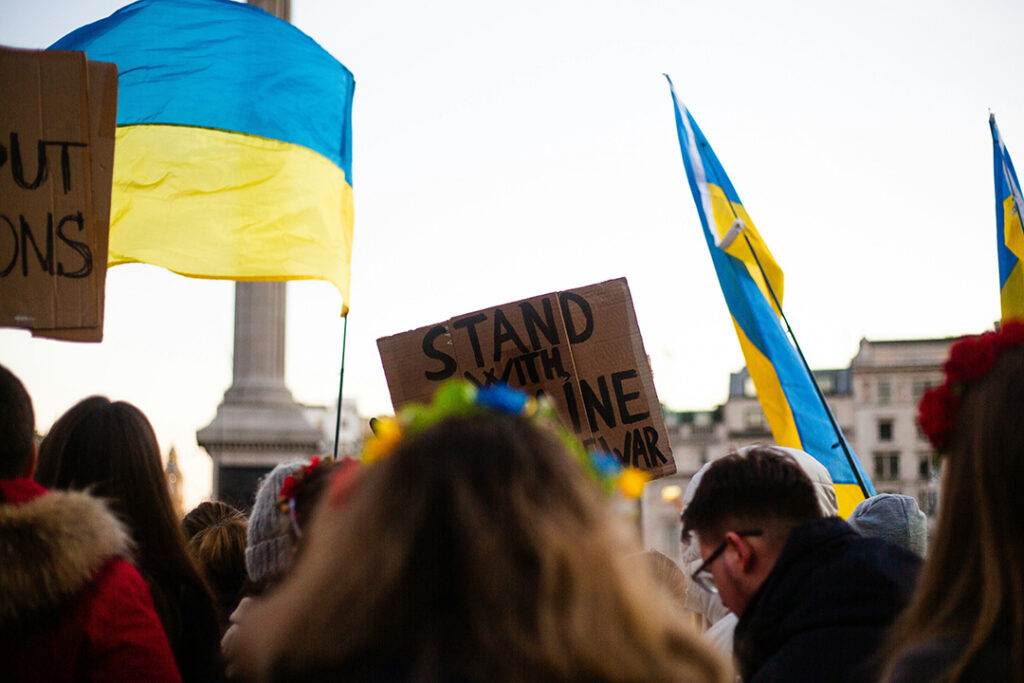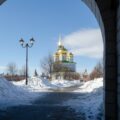Religious tensions and impacts in the Russo-Ukrainian war
Religious tensions and impacts in the Russo-Ukrainian War
More than geopolitics, the Russo-Ukrainian war is a deep-rooted religious conflict reshaping Eastern Orthodoxy and national identities.
The Russo-Ukrainian war, a geopolitical struggle that has captured international attention, is often perceived as a purely territorial and political dispute. However, a deeper undercurrent of religious beliefs, affiliations, and motivations lies beneath the surface. The historical ties and current tensions between the Russian and Ukrainian Orthodox churches play a significant role in shaping the region’s socio-political fabric.[1]
Ukraine and the ban on the Church of the Moscow Patriarchate
Centuries of shared religious history connect Ukraine and Russia. However, the ongoing conflict has strained these connections to a breaking point. In a move that sent shockwaves through Eastern Orthodoxy, the Ukrainian government recently took the bold step of banning the Church of the Moscow Patriarchate.[2] This decision is not just a political manoeuvre; it is a reflection of the growing desire among many Ukrainians to assert their religious independence from Russia. The ban has understandably elicited strong reactions. While many Ukrainians applauded the move as a necessary step toward self-determination, others decried it as an infringement on religious freedom.[3]
The religious dimension of the Russo-Ukrainian War
It is a grave oversimplification to consider the Ukraine conflict as merely a geopolitical controversy. Religious undertones have always been present, shaping the views and actions of both sides. Despite sharing many traditional and theological viewpoints, there are differences between Ukrainian and Russian Orthodox churches that have only been exacerbated by the current conflict. These differences transcend mere liturgical practices. They manifest in the form of loyalties, narratives, and even political affiliations. In this war, religious institutions are not mere bystanders; they are influential actors.[4] [5] [6]
Initiated by President Vladimir Putin to reinforce Russian dominance in the region, the conflict in Ukraine also represents a struggle over the destinies of the Russian and Ukrainian Orthodox churches. The Russian church, to which Archbishop Yefrem belongs, openly aims to unify the sects under Moscow’s patriarchal authority. This would grant it jurisdiction over the most sacred Orthodox sites in the Slavic world and a vast number of Ukrainian faithful. Conversely, since the country’s independence in 1991, the Ukrainian Orthodox Church has gradually established its autonomy from its patriarch by forging a distinct branch of Eastern Orthodoxy. Should Ukraine overcome the Russian aggression, it is highly likely that the influence of the Moscow church in Ukraine will diminish significantly. Conversely, a Russian victory might spell the end of the Ukrainian church’s presence within the country.[7]
Historical and recent events
Historical connections between Russia and Ukraine trace back to Kyivan Rus’,[8] a significant medieval state named after Kyiv, an early adopter of Orthodox Christianity. Over the centuries, Russia has sought to exert control over Ukraine, often using religion as an instrument of influence. The Russian Orthodox Church (ROC) has resisted Ukraine’s quest for an independent church, fueling present-day religious discord. The formation of an autonomous Ukrainian Orthodox Church in 1941 has deepened Russia’s sense of betrayal, contributing significantly to the motivations behind the invasion.[9]
In July 2023, a missile strike in Odesa resulted in fourteen hospitalisations, including four children, and devastated the Holy Transfiguration Cathedral, a vital religious site for Odesa’s Russian Orthodox Church in Ukraine (ROCU). This attack by Russia, which has caused numerous civilian casualties, targeted more than just physical structures; it struck at the heart of Ukraine’s Orthodox identity. Despite Russia’s assertions of a shared spiritual heritage with Ukraine to symbolise their unity, they attacked a cathedral tied to that very heritage. This act aligns with Russia’s stance that Ukraine has turned its back on their shared past by establishing an independent Orthodox church.[10]
Additionally, the Russian Orthodox Church has played a key role in stoking animosity towards Ukrainians. Patriarch Kirill, the ROC leader, exacerbated this hostility shortly after the invasion by framing the war as a cosmic struggle between good and evil.[11]
Ukrainian Orthodox Church and its European affiliations
As the gulf widens between the Ukrainian Orthodox Church and its Russian counterpart, there is a conscious push from Ukraine towards Europe. Strengthening ties with European churches is not just a matter of theological alignment; it is a strategic move, signalling Ukraine’s larger pivot towards the West. This ‘religious reorientation’ is bound to have significant implications for the future. Europe, with its diverse array of Orthodox traditions, offers Ukraine a chance to carve out a distinct religious identity, one that is free from Russian legacy.[12]
The potent mix of religion and politics
The Russo-Ukrainian War, in all its complexity, serves as a stark reminder of the potent mix of religion and politics. As the lines between faith and national identity blur, the hope is for a resolution that respects both religious freedom and territorial sovereignty. The ongoing saga of the Ukrainian and Russian Orthodox churches underscores the importance of understanding the multifaceted nature of modern conflicts.
Learn more about religion and society on the EARS Dashboard
Sources
[1] Consider other EARS articles on this issue: The role of religion in the war against Ukraine – EARS and Insights from the dashboard: The role of fake news and religion in the Russian invasion of Ukraine
[2] Ukrainian parliament votes to ban Orthodox Church over alleged links with Russia | Ukraine | The Guardian.
[3] Ukrainian parliament votes to ban Orthodox Church over alleged links with Russia | Ukraine | The Guardian.
[4] Why the Russian Orthodox Church Supports the War in Ukraine – Carnegie Endowment for International Peace
[5] Anger grows over Ukraine’s largest Orthodox church, aligned with Moscow despite war
[6] Ukraine’s Orthodox Churches as a Battleground in Russia’s Invasion — The Revealer
[7] Also at Stake in Ukraine: the Future of Two Orthodox Churches – The New York Times
[9] Ukraine’s Orthodox Churches as a Battleground in Russia’s Invasion — The Revealer
[10] Ukraine’s Orthodox Churches as a Battleground in Russia’s Invasion — The Revealer
[11] Ukraine’s Orthodox Churches as a Battleground in Russia’s Invasion — The Revealer






